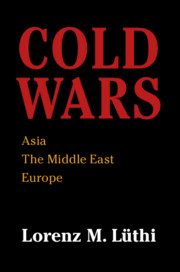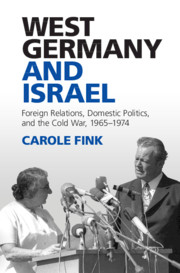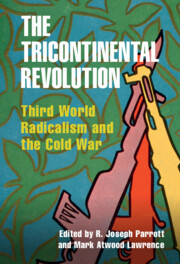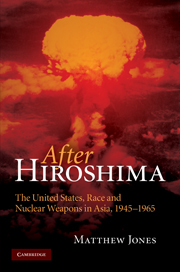Cold Wars
Asia, the Middle East, Europe
- Author: Lorenz M. Lüthi, McGill University, Montréal
- Date Published: March 2020
- availability: In stock
- format: Paperback
- isbn: 9781108407069
Paperback
Other available formats:
Hardback, eBook
Looking for an inspection copy?
This title is not currently available on inspection
-
What was the Cold War that shook world politics for the second half of the twentieth century? Standard narratives focus on Soviet-American rivalry as if the superpowers were the exclusive driving forces of the international system. Lorenz M. Lüthi offers a radically different account, restoring agency to regional powers in Asia, the Middle East and Europe and revealing how regional and national developments shaped the course of the global Cold War. Despite their elevated position in 1945, the United States, Soviet Union and United Kingdom quickly realized that their political, economic, and military power had surprisingly tight limits given the challenges of decolonization, Asian-African internationalism, pan-Arabism, pan-Islamism, Arab–Israeli antagonism, and European economic developments. A series of Cold Wars ebbed and flowed as the three world regions underwent structural changes that weakened or even severed their links to the global ideological clash, leaving the superpower Cold War as the only major conflict that remained by the 1980s.
Read more- Proposes a radical reinterpretation of the Cold War from the perspective of middle and smaller powers in Asia, the Middle East, and Europe
- Features new archival sources from two dozen archives in four different continents
- Analyses long-term economic, intellectual, and religious developments in multiple world regions to help us to comprehend the complexities of current times
Reviews & endorsements
'Epic in scope and daring in its intellectual ambition, Cold Wars forces us to rethink our conventional wisdom about the international history of the past hundred years. By taking a regional approach, more horizontal than vertical, Lorenz M. Lüthi reveals the inner workings of the Cold War system.' Andrew Preston, author of American Foreign Relations: A Very Short Introduction
See more reviews'An entirely new perspective on the Cold War as a global phenomenon, emphasizing regional and local contexts, and how the Superpower Cold War interacted with other prominent narratives. Lüthi's book is a must read for those who seek to understand the globalization of Cold War processes and the hybridizations that emerged outside of the Superpowers themselves.' O.A. Westad, author of The Cold War: A World History
'With the support of heroic efforts to engage in extensive, multilingual and multi-archival research, Lüthi has written a book, the first of its kind, that convincingly demonstrates why and how the Cold War was indeed global. This volume not only adds to the existing scholarship of the Cold War but also, and more importantly, significantly broadens and deepens the underlying agenda of Cold War studies in both academic and intellectual senses.' Chen Jian, author of Mao's China and the Cold War
'Lüthi pushes the boundaries of the new global cold war historiography. Asia, the Middle East, and Europe all mattered, and not just because the superpowers intervened there. Decolonization, the rivalry of middle powers, non-alignment, and pan-Islamism are all given their due. A singular achievement.' Robert Vitalis, author of White World Order, Black Power Politics: The Birth of American International Relations
'This book should command the attention of all Cold War historians. It is a book of prodigious research and immense erudition.' Melvyn P. Leffler, Journal of Cold War Studies
'The work is incredibly detailed …' Elizabeth Banks, The Russian Review
'For anyone interested in learning about the state of scholarship in Cold War studies, Lüthi's new book is a timely read … Clearly written for non-expert and scholarly audiences alike, this book would be an excellent addition to the reading list for an upper-level undergraduate course on Cold War history. Scholars of international studies and world history will be greatly interested in it too. Highly recommended.' X. Fan, Choice Magazine
Customer reviews
Not yet reviewed
Be the first to review
Review was not posted due to profanity
×Product details
- Date Published: March 2020
- format: Paperback
- isbn: 9781108407069
- length: 784 pages
- dimensions: 227 x 152 x 41 mm
- weight: 1.09kg
- contains: 10 maps
- availability: In stock
Table of Contents
Introduction
1. From high imperialism to Cold War division
Part I. Elusive Unities: Introduction to chapters 2 to 4
2. The United Kingdom and the Arab League
3. The Soviet Union and the socialist camp
4. The United States and the free world
Part II. Asia: Introduction to chapters 5 to 7
5. China
6. Vietnam
7. India
Part III. The Middle East: Introduction to chapters 8 to 10
8. Arab-Israeli relations, 1948–64
9. Arab-Israeli relations, 1964–75
10. The Palestinians
Part IV. Alternative World Visions: Introduction to chapters 11 to 13
11. Asian-African internationalism
12. Non-alignment
13. Pan-Islamism
Part V. Europe between the Superpowers: Introduction to chapters 14 to 16
14. Nuclear weapons
15. West European integration
16. The Council for Mutual Economic Assistance
Part VI. European Détente: Introduction to chapters 17 to 19
17. Germany
18. The Conference on Security and Cooperation in Europe
19. The Vatican
Part VII. The End of the Regional Cold Wars: Introduction to chapters 20 to 22
20. The Middle East
21. Asia
22. Europe
23. The end of the Superpower Cold War
24. Legacies of the Cold War
Conclusion.-
General Resources
Find resources associated with this title
Type Name Unlocked * Format Size Showing of
This title is supported by one or more locked resources. Access to locked resources is granted exclusively by Cambridge University Press to lecturers whose faculty status has been verified. To gain access to locked resources, lecturers should sign in to or register for a Cambridge user account.
Please use locked resources responsibly and exercise your professional discretion when choosing how you share these materials with your students. Other lecturers may wish to use locked resources for assessment purposes and their usefulness is undermined when the source files (for example, solution manuals or test banks) are shared online or via social networks.
Supplementary resources are subject to copyright. Lecturers are permitted to view, print or download these resources for use in their teaching, but may not change them or use them for commercial gain.
If you are having problems accessing these resources please contact [email protected].
Sorry, this resource is locked
Please register or sign in to request access. If you are having problems accessing these resources please email [email protected]
Register Sign in» Proceed
You are now leaving the Cambridge University Press website. Your eBook purchase and download will be completed by our partner www.ebooks.com. Please see the permission section of the www.ebooks.com catalogue page for details of the print & copy limits on our eBooks.
Continue ×Are you sure you want to delete your account?
This cannot be undone.
Thank you for your feedback which will help us improve our service.
If you requested a response, we will make sure to get back to you shortly.
×



